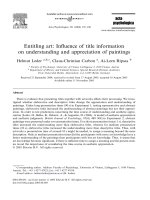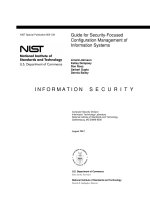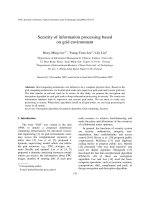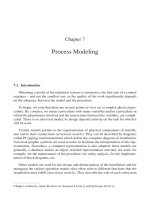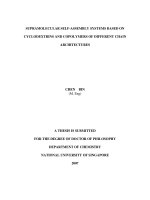lecture on safety and security of information systems lesson 7 7631
Bạn đang xem bản rút gọn của tài liệu. Xem và tải ngay bản đầy đủ của tài liệu tại đây (527.7 KB, 22 trang )
CRYPTOGRAPHIC HASH FUNTIONS
Contents
1)
Hash function
2)
Applications of Cryptographic Hash Functions
3)
Simple Hash Functions
4)
Requirements and Security
5)
Secure Hash Algorithm (SHA)
1. Hash function
A hash function maps a variable-length message into a fixed-length hash
value, or message digest: h= H(M)
1. Cryptographic hash function.
A cryptographic hash function is an algorithm for which it is
computationally infeasible to find either a data object that maps to a prespecified hash result or two data objects that map to the same hash result
2. Applications Of Cryptographic Hash Functions
Message Authentication
Digital signature
Message Authentication
Message authentication is a mechanism or service used to verify the
integrity of a message. Message authentication assures that data received
are exactly as sent
Message Authentication
Digital signature
The hash value of a message is encrypted with a user’s private key.
Anyone who knows the user’s public key can verify the integrity of the
message that is associated with the digital signature
Other Applications
Hash functions are commonly used to create a one-way password file
Hash functions can be used for intrusion detection and virus detection
3. Simple Hash Functions
Input (message, file,etc.) is viewed as a sequence of n-bit blocks
One of the simplest hash functions is the bit-by-bit exclusive-OR (XOR)
of every block. This can be expressed as:
4. Requirements And Security
5. Secure Hash Algorithm (SHA)
SHA-512
SHA-512
Step 1 Append padding bits: The padding consists of a single 1 bit
followed by the necessary number of 0 bits
Step 2 Append length: A block of 128 bits is appended to the message.
This block is treated as an unsigned 128-bit integer and contains the length
of the original message (before the padding).
SHA-512
Step 3 Initialize hash buffer: A 512-bit buffer is used to hold intermediate
and final results of the hash function. The buffer can be represented as
eight 64-bit registers (a, b, c, d, e, f, g, h). These registers are initialized to
the following 64-bit integers (hexadecimal values):
SHA-512
Step 4 Process message in 1024-bit (128-word) blocks:
SHA-512
Each round also makes use of an additive constant, where indicates one of
the 80 rounds.
SHA-512
SHA-512: Word Expansion
SHA-512
Step 5 Output: After all 1024-bit blocks have been processed, the output
from the Nth stage is the 512-bit message digest.

